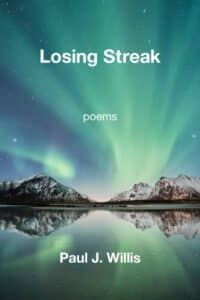Paul Willis surprises and delights with a formalist poetry collection
Free verse has reigned supreme in poetry for more than a century. It’s difficult for my contemporary mind not to experience a formal, more traditional poem (the kind written for at least 3,000 years) as either “that’s how they used to write poems” or “this is going to be a humorous poem.” Rhyming poems seem to lend themselves to humor (think limericks), irony, or even popular songs.
Yet I know full well that contemporary formalist poetry lives and flourishes; it’s even considered something of a movement. Simply read Dana Gioia, Mark Jarman, Brad Leithauser, or Mary Jo Salter, to mention only a few formalist poets. And Losing Streak, the new poetry collection by Paul Willis, falls comfortably into that category of formalism.
In fact, Willis initially met my formalist preconception with poems about silverfish, a highly regarded colleague, a knickknack on a rolltop desk, a new bookstore, a fellow worker’s retirement, and a fairy who wanders in through the window. The poems are light, and lighthearted, full of humor and rhyming fun. I rather smugly thought I had the collection all figured out.
And then I read this poem.
In the Aspen Grove

composed where the wind and branches wove
a halo of dusk-burned clouds in her hair,
and she was fair.
I saw the night in her doe-brown eyes
deepening in the clear moonrise,
her gaze abstracted and warm and cold,
and she was old.
I smelled the sage in the silver sky
and heard the stream that was rushing by
to sink in the desert sand like thought,
and she was not.
I was moved, almost to tears. And I realized that I did not have this collection all figured out.
Willis continues on with a mixture of both serious and light poems, including a short, funny one about Taylor Swift. He writes love poems, like the one above. He pays tribute to Clement Moore’s “A Visit from St. Nicholas” with his own variation — “Twas the Night after Christmas.” He takes a humorous look at William Wordsworth’s “Lines Composed a Few Miles Above Tintern Abbey” with his own version, written literally a few miles above (straight above) the ruin in an airplane. He visits Yosemite and Sequoia national parks in California and observes nature in its grandeur. He goes one up on Julia Ward Howe and sings “Battle Hymn of the Repugnant.” And he even casts the poet’s critical eye on the now ubiquitous Zoom meeting.

Paul Willis
Then I began to understand. Willis is a poet who loves words, yes, and he loves the sounds of words. He loves how words can be combined and fashioned to express the whole range of human emotions and experiences. He loves how rhymes can make ideas memorable and meaningful. He loves how words can be combined, often unexpectedly, to add humor and a little joy into life.
Willis loves words, and he loves poetry, reverently and irreverently.
Losing Streak is Willis’s eighth collection of poetry. He’s also published The Alpine Tales, an eco-fantasy novel; All in a Garden Green, a young adult Elizabethan time-travel novel; and two essay collections. An emeritus professor of English at Westmont College, he’s also co-edited two anthologies: In a Fine Frenzy: Poets Respond to Shakespeare and A Radiant Birth: Advent Readings for a Bright Season. A former poet laureate of Santa Barbara, California, he lives there with his family.
The poems of Losing Streak will make you laugh and move you to reflection. They’ll make you appreciate what formalist poems can do. And they’ll remind you of what it means to be human in all of its glory, irony, craziness, and fun. Willis has done something serious here, and I suspect he had a lot of fun doing it.
Photo by origiri-kun, Creative Commons, via Flickr. Post by Glynn Young.
How to Read a Poem uses images like the mouse, the hive, the switch (from the Billy Collins poem)—to guide readers into new ways of understanding poems. Anthology included.
“I require all our incoming poetry students—in the MFA I direct—to buy and read this book.”
—Jeanetta Calhoun Mish
- Longfellow’s “Paul Revere’s Ride”: Creating a National Legend - April 17, 2025
- Poets and Poems: Katie Kalisz and “Flu Season” - April 15, 2025
- Poets and Poems: Michelle Ortega and “When You Ask Me, Why Paris?” - April 10, 2025


Diana Trautwein says
Paul is one of my favorite people on the planet. When we moved to Santa Barbara for me to become associate pastor at the church he and his wife attend, he immediately became a kind and generous supporter of mine. I value his friendship very highly indeed. I am awaiting my copy of this book – having ordered it last week and will enjoy this new volume immensely, I am sure.